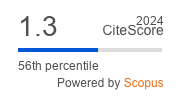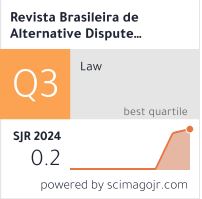A função da Resolução Alternativa de Disputas no desenvolvimento de um ambiente acadêmico inclusivo em um campus interuniversitário
DOI:
https://doi.org/10.52028/rbadr.v7.i13.ART08.RUPalavras-chave:
Direito constitucional, Direito à educação, Educação inclusiva, Ensino superior inclusivo, Direito internacional, Direitos humanos, Educação para todos, Resolução alternativa de disputas, Mediação, Arbitragem, Negociações informaisResumo
As autoras deste artigo investigam as especificidades da implementação do direito humano à educação para todos no âmbito do ensino superior. Elas utilizam diversos métodos, incluindo análise jurídica comparada, análise qualitativa de dados, estudo de caso, indução e dedução, para avaliar a necessidade de ampliar a interpretação da inclusão nos projetos nacionais russos, a fim de aumentar a atratividade do ensino superior por meio de campi universitários de nível internacional. Com base em suas descobertas, os pesquisadores identificam novas categorias de cidadãos vulneráveis e destacam a importância dos métodos de resolução alternativa de disputas (ADR) para garantir a implementação da inclusão no ambiente acadêmico de um campus interuniversitário. Por fim, concluem que seus resultados permitem combinar dois aspectos-chave: garantir a inclusão como princípio fundamental do Estado de Direito na esfera acadêmica e utilizar métodos de ADR como uma ferramenta eficaz para prevenir e resolver conflitos dentro da comunidade universitária.
Referências
BJERKE A. H., DALLAND C. Negotiating performative and professional accountability in inclusive mathematics education in Norway, International Journal of Educational Research, 129, 102518. 2025.
CELÍK, S., & OZENC-IRA, G. Being outside the circle vs. squaring the circle: Perceptions of Syrian refugee students and academics on inclusive campus climate, International Journal of Intercultural Relations, 102, 102021. 2024.
DETOCHENKO L. S. Modern tendencies of ensuring inclusivity in the paradigm of higher education, Sociologija, 4, pp. 145-152. 2022.
DYACHKOVA M. A., TOMYUK O. N. Inclusive organizational culture as a culture of diversity accep tance and mutual understanding, Perspektivy Nauki i Obrazovanija, 41 (5), pp. 373-385. 2019.
FERREIRA, D. B., GROMOVA E.A., TITOVA E.V. The Principle of a Trial Within a Reasonable Time and JustTech: Benefits and Risks, Human Rights Review, 25, 1. P. 47-56, 2024.
FERREIRA, D. B., SEVERO, L. Multiparty Mediation as Solution for Urban Conflicts: A Case Analysis from Brazil, BRICS Law Journal, 8(3), 5-29, 2021. https://doi.org/10.21684/2412-2343-2021-8-3-5-29
GROMOVA, E.A., FERREIRA, D.B. Regulatory Sandbox: Bridging the Gaps by Designing a Dispute Resolution System. Conflict Resolution Quarterly, 2025. https://doi.org/10.1002/crq.21482
GROMOVA, E., FERREIRA, D.B. On the Way to BRICS+ Digital Sovereignty: Opportunities and Challenges of a New Era, BRICS Law Journal, 11, 3, P. 54-69, 2024. DOI 10.21684/2412-2343-2024-11-3-54-69.
GREBENJUK, I.JU. Support of social and emotional state of refugee students, Innovacionnaja nauka, 2 (2), pp. 94-98. 2023.
GONZALO, Ó., HERAS, I. Impact of the Quality of Life Supports Model on the inclusion of students with disabilities in higher education: A scoping review. Research in Developmental Disabilities, 154, 104850. 2024.
HUTSON, J., & HUTSON, P. Digital inclusion for people with autism spectrum disorders: Review of the current legal models and doctrinal concepts, Journal of Digital Technologies and Law, 1(4), pp. 851-879. 2023.
IQBAL, A. S. M. Tariq. Alternative Dispute Resolution in commercial transactions: A comparative study between the UK and Bangladesh Jurisdiction. Revista Brasileira de Alternative Dispute Resolution – RBADR, Belo Horizonte, ano 06, n. 12, p. 207-222, jul./dez. 2024. DOI: 10.52028/ rbadr.v6.i12.ART10.BGL.RBADR12_MIOLO.indd
KANTOR, V. Z. & PROEKT, Y. L. Inclusive higher education: Socio-psychological well-being of stu dents. The Education and science journal, 21(2), pp. 51-73. 2019.
KANTOR, V. Z. & PROEKT, Y. L. Inclusive educational process at the university: Theoretical and experimental model of teachers’ psychological readiness, The Education and science journal, 23(3), pp. 156-182. 2021.
MORIÑA A., PERERA V. H. Training needs of academics on inclusive education and disability, SAGE open, 10(3), 2158244020962758. 2020.
PRISIAZHNIUK, D., MAKOELLE, T. M., & ZANGIEVA, I. Teachers’ attitudes towards inclusive educa tion of children with special educational needs and disabilities in central Asia. Children and Youth Services Review, 160, 107535. 2024.
SBAITI M., COHEN, E. The ‘us and them divide’: A qualitative study of student experiences of glo bal health education through the lens of ‘inclusivity’, Social Science & Medicine, 117759. 2025.
SILVA, F. G. da. Educational inclusion in Brazil: a challenge for higher education, European Journal of Multidiscipli-nary Studies, 3(1), pp.16-20. 2018.
SMANTSER, A. & IGNATOVITCH, E. Future teacher training for work in inclusive educational environ ment: experimental study results, Procedia-Social and Behavioral Sciences, 214, pp. 422-229. 2015. VOLOSNIKOVA, L. M., ZAGVYAZINSKIY, V. I. The convergence of the concepts of academic and inclusive excellence at research universities. The Education and science journal, 23(4), pp. 43- 78. 2021.
WALTON, E. & ENGELBRECHT, P. Inclusive education in South Africa: Path dependencies and emergences, International Journal of Inclusive Education, 28(10), pp. 2138-2156. 2024.
WATKINS, A., D’ALESSIO, S. Inclusive Education, Research in Comparative and International Education, 4(3), pp. 229-232. 2009.
WOLFF CH. E., HUILLA H. Inclusive education in the diversifying environments of Finland, Iceland and the Netherlands: A multilingual systematic review, Research in Comparative and International Education, 16(1), pp. 3-21. 2021.
WOODCOCK, S., ANDERSON, J. Conceptions to classrooms: The influence of teacher knowledge on inclusive classroom practice, International Journal of Educational Research Open, 8, 100412. 2025.
QU, X. Making sense of policy development of inclusive education for children with disabilities in China, International Journal of Chinese Education, 13(1), 2212585X241234332. 2024
Downloads
Publicado
Edição
Seção
Licença

Este trabalho está licenciado sob uma licença Creative Commons Attribution 4.0 International License.
Não serão devidos direitos autorais ou qualquer outra remuneração pela publicação dos trabalhos.
As opiniões emitidas pelos autores dos artigos e resenhas são de sua exclusiva responsabilidade.







